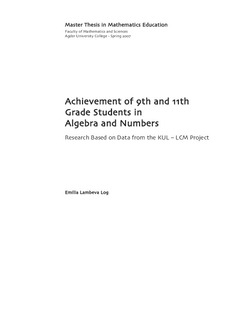| dc.contributor.author | Log, Emilia Lambeva | |
| dc.date.accessioned | 2007-10-02T09:24:13Z | |
| dc.date.issued | 2007 | |
| dc.identifier.uri | http://hdl.handle.net/11250/138047 | |
| dc.description | Masteroppgave i matematikkdidaktikk 2007 - Høgskolen i Agder, Kristiansand | en |
| dc.description.abstract | The project Learning Communities in Mathematics (LCM) is a project established by the
Agder University College (HiA) in 2004 and supported by the Research Council of Norway.
The aims of the project include to design and study mathematics teaching development
through communities of inquiry between teachers from the school participating in the project
and didacticians from HiA who research the outcome of the project.
Part of the LCM project is a longitudinal study of students’ achievements in 4th, 7th, 9th and
11th grade. Groups of students in those grades, from seven schools participating in the project
are given diagnostic tests at the beginning and at the end of the school year. The tests are
designed to fit the goals of the mathematical curriculum for those grades. Those tests were
first given to groups of students in the fall of 2004 and in the spring of 2005. The same tests
were used again during the school year 2005 – 2006, but with new groups of students in 4th,
7th, 9th and 11th grade participating.
The study reported in this thesis, focuses on the students’ results on the tests given in 9th and
11th grade, the school year 2005 – 2006. The necessary data for this study was coded and
analysed. This data included:
• Data 9th grade
9th grade students’ results to a test performed at the beginning and at the end of the school
year 2005 – 2006: Test 1- the total number of students is 167; Test 2- the total number of
students is 94.
• Data 11th grade
11th grade students’ results to a test performed at the beginning and at the end of the school
year 2005 – 2006: Test 1- the total number of students is 227; Test 2- the total number of
students is 126.
The big drop out of students is due to some misunderstanding - the second test was not
performed in some of the classes in certain schools.
The main aims of this study are first of all concerning the development during the school year
2005 – 2006 and second concerning the longitudinal perspective of the project:
• What are the students’ achievements shown in the results on the tests? What is the
development revealed in the students’ results for the school year?
• How can the students’ results be compared with the results of the other studies in the
LCM project?
• What comparison can be made of the students’ results on selected tasks and the results
on similar tasks from studies performed before the curriculum L97 took place?
The study assesses to what extent the students in 9th grade of lower secondary school and 11th
grade in upper secondary school acquired knowledge and skills that are essential for
mathematical literacy. In this study the achievements of 9th and 11th grade students in algebra
and number for the school year 2005 -2006 are compared with the achievements of the groups
of students participating in the previous school year 2004 -2005. In addition for some of the
tasks a comparison is made with results from other projects. | en |
| dc.format.extent | 9756735 bytes | |
| dc.format.mimetype | application/pdf | |
| dc.language.iso | eng | en |
| dc.publisher | Høgskolen i Agder | |
| dc.publisher | Agder University College | |
| dc.subject.classification | MA500 | |
| dc.subject.classification | MA502 | |
| dc.title | Achivement of 9th and 11th grade students in algebra and numbers : research based on data from the KUL - LCM project | en |
| dc.type | Master thesis | en |
| dc.subject.nsi | VDP::Samfunnsvitenskap: 200::Pedagogiske fag: 280::Fagdidaktikk: 283 | |
| dc.subject.nsi | VDP::Matematikk og naturvitenskap: 400::Matematikk: 410 | |
